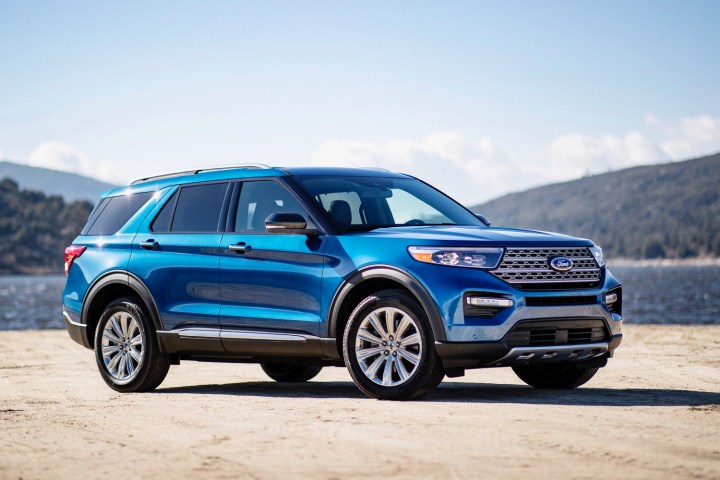
The redesigned 2020 Ford Explorer offers a number of improvements over the outgoing version, including better gas mileage. The Explorer gets a hybrid powertrain option for the first time, and now that Official Environmental Protection Agency fuel-economy figures are available, we can finally see if it has a significant impact on fuel consumption.
The 2020 Ford Explorer Hybrid is rated at 28 mpg combined (27 mpg city, 29 mpg highway) with rear-wheel drive, and 25 mpg combined (23 mpg city, 26 mpg highway) with all-wheel drive. That’s significantly better than the most efficient previous-generation Explorer, as well as most other similarly sized vehicles. But it’s more noteworthy that the Explorer Hybrid achieves those numbers without sacrificing capability.
Ford claims the Explorer Hybrid can also tow up to 5,000 pounds, which is about the norm for this segment. That’s also 1,500 pounds more than a 2019 Toyota Highlander Hybrid, Ford noted in a press release. But the Toyota also achieves slightly better fuel economy, at 29 mpg combined (30 mpg city, 28 mpg highway), albeit only in the LE Plus trim. A redesigned Highlander is also on the way, which may yield improvements in fuel economy or towing capacity.
As for the rest of the 2020 Explorer lineup, models equipped with the 2.3-liter turbocharged EcoBoost four-cylinder engine are rated at 24 mpg combined (21 mpg city, 28 mpg highway) with rear-wheel drive, and lose 1 mpg in each category with all-wheel drive. That’s a slight improvement over a 2019 Explorer equipped with the same engine, which can probably be chalked up to the 2020 model’s 10-speed automatic transmission and lower average curb weight.
The 3.0-liter twin-turbocharged EcoBoost V6 used in the Explorer ST and Platinum models comes with a significant penalty in fuel economy. Available only with all-wheel drive, it’s rated at 20 mpg combined (18 mpg city, 24 mpg highway). This is the option for buyers who care more about performance than gas mileage. The V6 produces 365 horsepower and 380 pound-feet of torque in the Platinum model, and 400 hp and 415 lb.-ft. in the ST. That’s a major increase over the four-cylinder Explorer’s 300 hp and 310 lb.-ft., and the Explorer Hybrid’s 318 hp and 322 lb.-ft.
Getting the best fuel economy comes at a premium. Pricing for the 2020 Ford Explorer starts at $37,870 for a base model with rear-wheel drive and the four-cylinder EcoBoost engine. To get the Explorer Hybrid, buyers have to step up from the XLT to the Limited trim level, which inflates the base price to $53,475.


